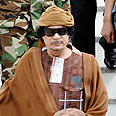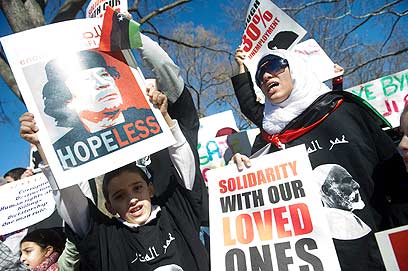
'Mostly in the dark.' Gadaffi
Photo: AP
A doctor says Moammar Gaddafi's forces have killed at least 200 protesters in the eastern city of Benghazi as it tries to crush a rebellion that has spread to more than a half-dozen cities across the country.
Witnesses told The Associated Press a mix of special commandos, foreign mercenaries and Gaddafi loyalists assaulted demonstrators in Benghazi on Saturday with knives, assault rifles and heavy weapons. Those protesters were burying 35 marchers who were slain Friday by government forces.
Call to Arms
Libyan leader says 'time of popular revolutions' is here, calls on refugees to mass on Israel's borders as he accuses Western powers of being enemies of Islam
Benghazi has been at the center of a six-day revolt by Libyans inspired by uprisings in Egypt and Tunisia and frustrated by Gaddafi's more than 40 years of authoritarian rule.
The Benghazi doctor said his hospital, one of two in Libya's second-largest city, is out of supplies and cannot treat more than 70 wounded who were hit in the attacks and need attention.
"I am crying," the doctor said. "Why is the world not listening?"
The doctor spoke on condition of anonymity for fear of reprisal, as did several other witnesses in Libya.

Supporters of the Libyan uprising rally in Washington (Photo: AP)
Protesters remain defiant despite facing repeated assaults, and some opposition leaders in exile claim that several towns in the nation's eastern provinces are now under control of forces which are no longer loyal to Gaddafi.
Jamal Eddin Mohammed, a 53-year old resident of Benghazi, said thousands are marching toward the city's cemetery to bury at least a dozen protesters. The march, he said, would pass by Gaddafi's residential palace and the regime's local security headquarters.
Mohammed said protesters feared more clashes with the government.
"Everything is behind that (Gaddafi) compound; hidden behind wall after wall. The doors open and close and soldiers and tanks just come out, always as a surprise, and mostly after dark," he said.
The mourners were chanting: "The people demand the ouster of the regime," which became a mantra for protesters in Egypt and Tunisia.
Mohammed Abdullah, an exiled leader of the Libyan Salvation Front, said government troops in parts of Benghazi, Beyida and Tobruk have severed ties with their command in Tripoli. Protests also have spread to outside the southern city of Zentan and west to Mesrata, the third-biggest city in Libya.
Getting concrete details about Libya's increasingly chaotic situation has been difficult because journalists cannot work freely inside the country. Information about the uprising has come through telephone interviews, along with videos and messages posted online, and through opposition activists in exile.
The US-based Arbor Networks reported another Internet service outage in Libya just before midnight Saturday night. The company says online traffic ceased in Libya about 2 am Saturday, was restored at reduced levels several hours later, only to be cut off again that night.
People in Libya also said they can no longer make telephone calls on their land lines.
Before Saturday's violence, Human Rights Watch estimated at least 84 people had been killed in anti-Gaddafi unrest.
Abdullah said smaller protests were staged Saturday night on the outskirts of the capital Tripoli, a stronghold of support for Gaddafi, but demonstrators were quickly dispersed by security men. Besides Tripoli and Benghazi, the US State Department in a travel warning to American citizens listed five other cities that have seen demonstrations.
Supporters of the Libyan uprising also demonstrated in Switzerland and in Washington on Saturday, waving flags and burning Gaddafi's photo.
- Follow Ynetnews on Facebook















